#Urumqi fire
Text
What's Happening in China? The November 2022 Protests
Hello! I know that there's so much going on in the world right now, so not everyone may be aware of what is happening in China right now. I thought that I would try to write a brief explainer, because the current wave of protests is truly unprecedented in the past 30+ years, and there is a lot of fear over what may happen next. For context, I'm doing this as someone who has a PhD in Asian Studies specialising in contemporary Chinese politics, so I don't know everything but I have researched China for many years.
I'll post some decent links at the end along with some China specialists & journalists I follow on Twitter (yeah I know, but it's still the place for the stuff at the moment). Here are the bullet points for those who just want a brief update:
Xi Jinping's government is still enacting a strict Zero Covid policy enforced by state surveillance and strict lockdowns.
On 24 November a fire in an apartment in Urumqi, Xinjiang province, killed 10. Many blamed strict quarantine policies on preventing evacuation.
Protests followed and have since spread nationwide.
Protesters are taking steps not seen since Tiananmen in 1989, including public chants for Xi and the CCP to step down.
Everyone is currently unsure how the government will respond.
More in-depth discussion and links under the cut:
First a caveat: this is my own analysis/explanation as a Chinese politics specialist. I will include links to read further from other experts and journalists. Also, this will be quite long, so sorry about that!
China's (aka Xi Jinping's) Covid Policy:
The first and most important context: Xi has committed to a strict Zero Covid policy in China, and has refused to change course. Now, other countries have had similar approaches and they undoubtedly saved lives - I was fortunate to live in New Zealand until this year, and Prime Minister Ardern's Zero Covid approach in 2020-2021 helped protect many. The difference is in the style/scope of enforcement, the use of vaccines, and the variant at play. China has stepped up its control on public life over the past 10 years, and has used this to enforce strict quarantine measures without full regard to the impact on people's lives - stories of people not getting food were common. Quarantine has also become a feared situation, as China moves people to facilities often little better than prisons and allegedly without much protection from catching Covid within. A personal friend in Zhengzhou went through national, then provincial, then local quarantines when moving back from NZ, and she has since done her best to avoid going back for her own mental and physical health. Xi has also committed China to its two home-grown vaccines, Sinovac and Sinopharm, both of which have low/dubious efficacy and are considered ineffective against new variants. Finally, with delta and then omicron most of the Zero-Covid countries have modified their approach due to the inability to maintain zero cases. China remains the only country still enacting whole-city eradication lockdowns, and they have become more frequent to the point that several are happening at any given time. The result is a population that is incredibly frustrated and losing hope amidst endless lockdowns and perceived ineffectiveness to address the pandemic.
Other Issues at Play:
Beyond the Covid situation, China is also wrestling with the continued slowdown in its economic growth. While its economic rise and annual GDP growth was nigh meteoric from the 80s to the 00s, it has been slowing over the past ten years, and the government is attempting to manage the transition away from an export-oriented economy to a more fully developed one. However, things are still uncertain, and Covid has taken its toll as it has elsewhere the past couple of years. Youth unemployment in particular is reaching new highs at around 20%, and Xi largely ignored this in his speech at the Party Congress in October (where he entered an unprecedented third term). As a result of the perceived uselessness of China's harsh work culture and its failure to result in a better life, many young Chinese have been promoting 躺平 tǎng píng or "lying flat", aka doing the bare minimum just to get by (similar to the English "quiet quitting"). The combination of economic issues and a botched Covid approach is important, as these directly affect the lives of ordinary middle-class Chinese, and historical it has only been when this occurred that mass movements really took off. The most famous, Tiananmen in 1989, followed China's opening up economic reforms and the dismantling of many economic safety nets allowing for growing inequality. While movements in China often grow to include other topics, having a foundation in something negatively impacting the average Han Chinese person's livelihood is important.
The Spark - 24 Nov 2022 Urumqi Apartment Fire:
The current protests were sparked by a recent fire that broke out in a flat in Urumqi, capital of the Xinjiang province. (This is the same Xinjiang that is home to the Uighur people, against whom China has enacted a campaign of genocide and cultural destruction.) The fire occurred in the evening and resulted in 10 deaths, which many online blamed on the strict lockdown measures imposed by officials, who prevented people from leaving their homes. It even resulted in a rare public apology by city officials. However, with anger being so high nationwide, in addition to many smaller protests that have occurred over the past two years, this incident has ignited a nationwide movement.
The Protests and Their Significance:
The protests that have broken out over the past couple of days representing the largest and most significant challenge to the leadership since the 1989 Tiananmen movement. Similar to that movement, these protests have occurred at universities and cities across the country, with many students taking part openly. This scale is almost unseen in China, particularly for an anti-government protest. Other than Tiananmen in 1989, the most widespread movements that have occurred have been incidents such as the protest of the 1999 Belgrade bombings or the 2005 and then 2012 anti-Japanese protests, all of which were about anger toward a foreign country.
Beyond the scale the protests are hugely significant in their message as well. Protesters are publicly shouting the phrases "习近平下台 Xí Jìnpíng xiàtái!" and "共产党 下台 Gòngchǎndǎng xiàtái!", which mean "Xi Jinping, step down/resign!" and "CCP, step down/resign!" respectively. To shout a direct slogan for the government to resign is unheard of in China, particularly as Xi has tightened control of civil society. And people are doing this across the country in the thousands, openly and in front of police. This is a major challenge for a leader and party who have prioritised regime stability as a core interest for the majority of their history.
Looking Ahead:
Right now, as of 15:00 Australian Eastern time on Monday, 28 November 2022, the protests are only in their first couple of days and we are unsure as to how the government will respond. Police have already been seen beating protesters and journalists and dragging them away in vehicles. However, in many cases the protests have largely been monitored by police but still permitted to occur. There seems to be uncertainty as to how they want to respond just yet, and as such no unified approach.
Many potential outcomes exist, and I would warn everyone to be careful in overplaying what can be achieved. Most experts I have read are not really expecting this to result in Xi's resignation or regime change - these things are possible, surely, but it is a major task to achieve and the unity & scale of the protest movement remains to be fully seen. The government may retaliate with a hard crackdown as it has done with Tiananmen and other protests throughout the years. It may also quietly revamp some policies without publicly admitting a change in order to both pacify protesters and save face. The CCP often uses mixed tactics, both coopting and suppressing protest movements over the years depending on the situation. Changing from Zero Covid may prove more challenging though, given how much Xi has staked his political reputation on enforcing it.
What is important for everyone online, especially those of us abroad, is to watch out for the misinformation campaign the government will launch to counter these protests. Already twitter is reportedly seeing hundreds of Chinese bot accounts mass post escort advertisements using various city names in order to drown out protest results in the site's search engine. Chinese officials will also likely invoke the standard narrative of Western influence and CIA tactics as the reason behind the protests, as they did during the Hong Kong protests.
Finally, there will be a new surge of misinformation and bad takes from tankies, or leftists who uncritically support authoritarian regimes so long as they are anti-US. An infamous one, the Qiao Collective, has already worked to shift the narrative away from the protests and onto debating the merits of Zero Covid. This is largely similar to pro-Putin leftists attempting the justify his invasion of Ukraine. Always remember that the same values that you use to criticise Western countries should be used to criticise authoritarian regimes as well - opposing US militarism and racism, for example, is not incompatible with opposing China's acts of genocide and state suppression. If you want further info (and some good sardonic humour) on the absurd takes and misinfo from pro-China tankies, I would recommend checking out Brian Hioe in the links below.
Finally, keep in mind that this is a grass-roots protest made by people in China, who are putting their own lives at risk to demonstrate openly like this. There have already been so many acts of bravery by those who just want a better future for themselves and their country, and it is belittling and disingenuous to wave away everything they are doing as being just a "Western front" or a few "fringe extremists".
Links:
BBC live coverage page with links to analysis and articles
ABC (Australia) analysis
South China Morning Post analysis
Experts & Journalists to Check Out:
Brian Hioe - Journalist & China writer, New Bloom Magazine
Bonnie Glaser - China scholar, German Marshall Fund
Vicky Xu - Journalist & researcher, Australian Strategic Policy Institute
Stephen McDonnell - Journalist, BBC
M Taylor Fravel - China scholar, MIT
New Zealand Contemporary China Research Centre - NZ's hub of China scholarship (I was fortunate to attend their conferences during my PhD there, they do great work!)
If you've reached the end I hope this helps with understanding what's going on right now! A lot of us who know friends and whanau in China are worried for their safety, so please spread the word and let's hope that there is something of a positive outcome ahead.
#孟珏’s china corner#中国#上海#习近平#习近平下台#共产党下台#China#Shanghai#China protests#China protests 2022#Xi Jinping#Xi Jinping step down#CCP step down#Xi Jinping resign#CCP resign#乌鲁木齐#Urumqi#Urumqi fire#Urumqi apartment fire
1K notes
·
View notes
Text
Begging you guys to look at what's happening in China
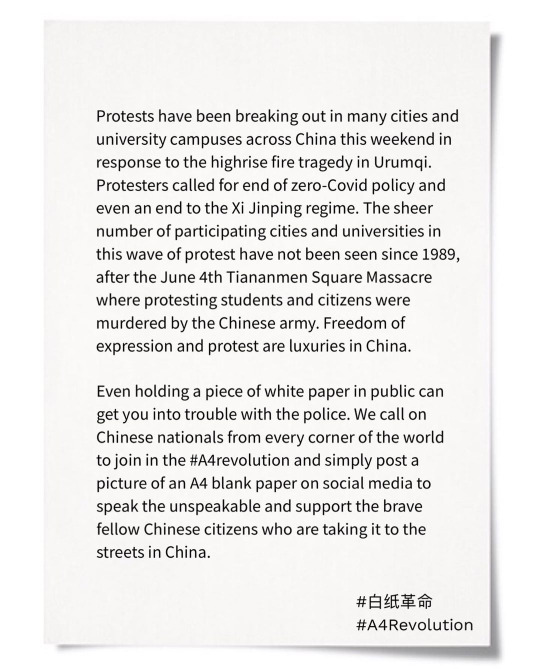

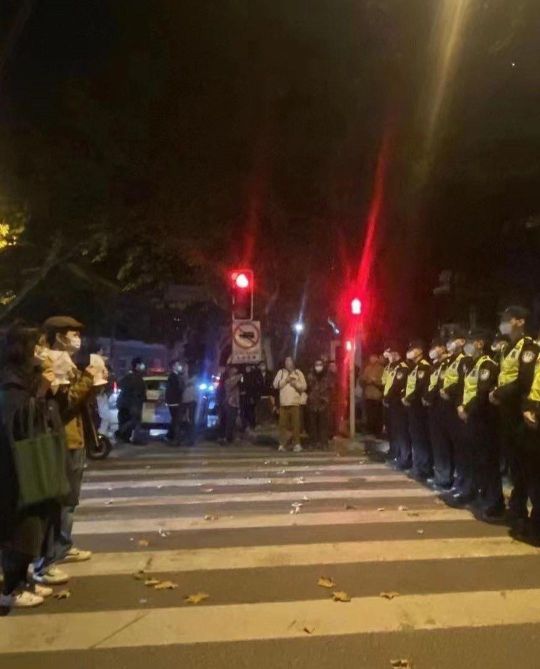

If you have a minute to spare, please consider reading and sharing this post.
[image ID: various photos about the #A4 revolution that is happening in China.
1st photo: a piece of white A4 paper with the following text on it: "Protests have been breaking out in many cities and university campuses across China thsi weekend in response to the highrise fire tragedy in Urumqi. Protesters called for end of zero-Covid policy and even an end to the Xi Jinping regime. The sheer number of particiipating cities and universities in this wave of protest have not been seen since 1989, after the June 4th Tiananmen Square Massacre where protesting students and citizens were murdered by the Chinese army. Freedom of expression and protest are luxuries in China. Even holding a piece of white paper in public can get you into trouble with the police. We call on Chinese nationals from every corner of the world to join in the #A4revolution and simply post a picture of an A4 blank paper on social media to speak the unspeakable and support the brave fellow Chinese citizens who are taking it to the streets in China." In the bottom right hand corner are the hashtags #白纸革命 and #A4 revolution.
2nd photo: protesters holding up pieces of white, blank A4 paper. The third photo is has protesters holding up paper on the left side, and a row of police standing guard right across from them. The fourth photo is of a piece of blank A4 paper
3rd photo: protesters holding up paper on the left side, and a row of police standing guard right across from them.
4th photo: a blank, white piece of A4 paper
end ID.]
I don't wanna guilt trip people and say things like "if you don't reblog this you don't care". but not a lot of people in the world know about what is happening in China right now so I'd really appreciate it if you'd share it with your family, friends, and peers.
The images above are reposted from the instagram account @citizensdailycn. If you speak Chinese and are not up to date regarding the situation please check them out at https://www.instagram.com/citizensdailycn/. They are also on twitter under the same username: https://twitter.com/CitizensDailyCN. If you speak English, you can check out their English counterpart, @whatsup_beijing: https://www.instagram.com/whatsup_beijing. Actual footage of the protests can be found on the Instagram account @northern_square: https://www.instagram.com/northern_square. If you want to distribute posters, here are some designs protestors have made: https://www.dropbox.com/sh/vgjmsp8dgjnav93/AAD04p5ljQZ1hi9YSz4TAfmHa/%E6%9C%89hashtag%E6%B5%B7%E6%8A%A5?dl=0&subfolder_nav_tracking=1, https://www.dropbox.com/sh/vgjmsp8dgjnav93/AACsR7d5ICrG7hlYPErJSIuEa/%E6%97%A0hashtag%E6%B5%B7%E6%8A%A5?dl=0&subfolder_nav_tracking=1, https://drive.google.com/drive/folders/1ql2CyIZfWy36nFRn0ahu83oCxh5zRXAj
This is the first time I've posted anything like this, and it is 2:49 AM in the morning so my post might not be perfect. If anyone has any resources or additions please feel free to add them in the reblogs! Also if you think the image IDs need improvement, or that I need more trigger/content warning tags please let me know by sending an ask or a message. Thank you.
#china#politics#protests#current events#human rights#covid 19#tw politics#tw police#important#long post
1K notes
·
View notes
Text
Hi tumblr.. Please pay some attention to the incident happened in my country China, city Urumqi, Xinjiang. The city was blocked for more than 100 days due to the epidemic, which seriously affected people's life. On November 24, a fire broke out in a community in Urumqi, but the firefighters were unable to put out the fire in time because of the blockade. In the end ten People died, including a 3-year-old child. Last night (11.25) the people of Urumqi finally took to the streets out of despair and anger. They went to the city hall to march and protest, and confronted the police. This was extremely brave but also very dangerous.
Chinese Internet is extremely closed, and all content posted online is subject to examination and control. We are trying our best to convey this message to more people.
I'm very sorry if I disturbed you all, but if possible, please give the people of my country a little international attention and support, thank you😢If you need more content please check this twitter account:
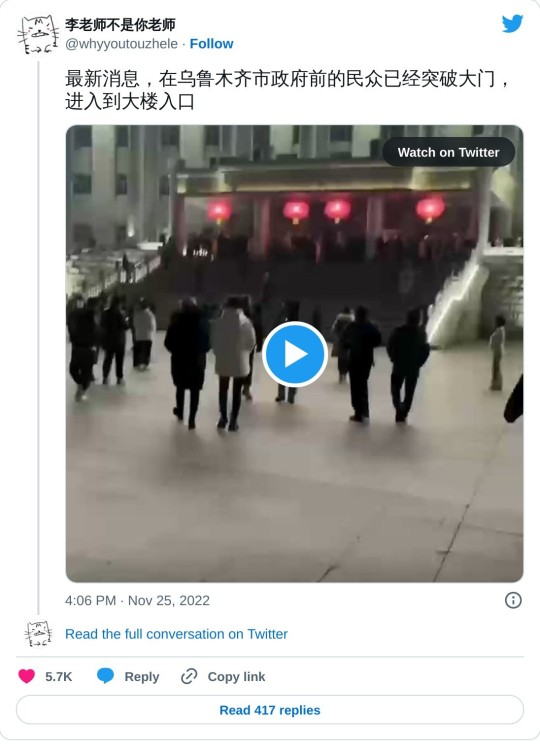
I am really desperate and terribly worried for people of Urumqi right now and I hope this incident could reach to more people around the world. Thank you.
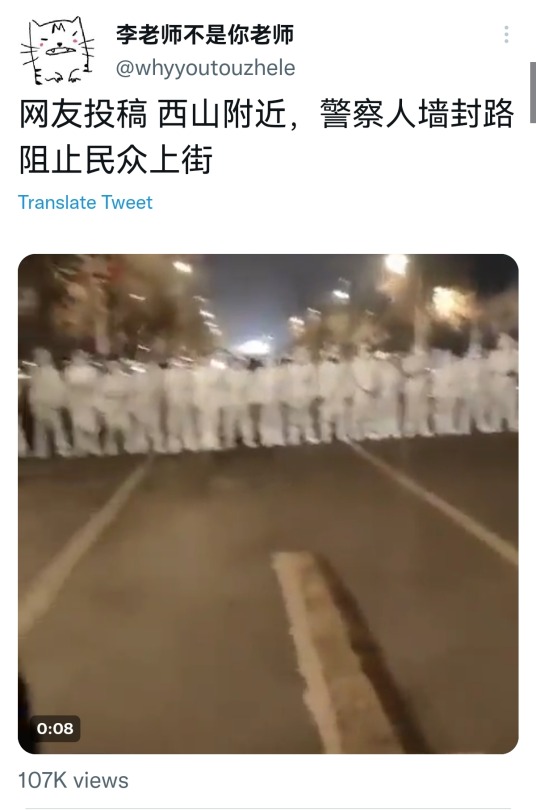
#Xinjiang#Urumqi#China#blockade#中国#新疆#乌鲁木齐#covid 19#coronavirus#pandemic#protest#march#international news#chinese news
1K notes
·
View notes
Text
THERE IS OPPRESSION IN EASTERN TURKISTAN😓
هناك اضطهاد في شرق تركستان😓
DOĞU TÜRKİSTAN'DA ZULÜM VAR😓
in a 21-storey building in Urumqi.
lost his mother and 4 siblings in the fire Şeraf Memeteli from East Turkestan called out:
There is persecution in East Turkestan. I this I lost my family in the fire. not yet deceased
Even my youngest brother's face
I did not see. Due to China's quarantine sanctions 44 people who could not get out died.
في مبنى مكون من 21 طابقًا في أورومتشي.
فقد والدته و 4 من إخوته في الحريق
شراف مميتلي من تركستان الشرقية
خارج نطاق الخدمة:
هناك اضطهاد في تركستان الشرقية. أنا هذا
لقد فقدت عائلتي في الحريق. لم يتوفى بعد
حتى وجه أخي الأصغر لم ارى.
بسبب عقوبات الحجر الصحي الصينية
44 شخصًا لم يتمكنوا من الخروج ماتوا.
Urumçi'de 21 katlı binada çıkan yangında annesi ve 4 kardeşini kaybeden Doğu Türkistanlı Şerafet Memeteli dünyaya seslendi:
Doğu Türkistan'da zulüm var. Ben bu
yangında ailemi kaybettim. Henüz vefat eden en küçük kardeşimin yüzünü bile görmedim.
Çin'in karantina yaptırımı sebebiyle binadan çıkamayan 44 kişi hayatını kaybetmişti.
https://www.instagram.com/nevzat.boyraz44/?hl=tr
139 notes
·
View notes
Link
35 notes
·
View notes
Text
China Update: 27 Nov 2022


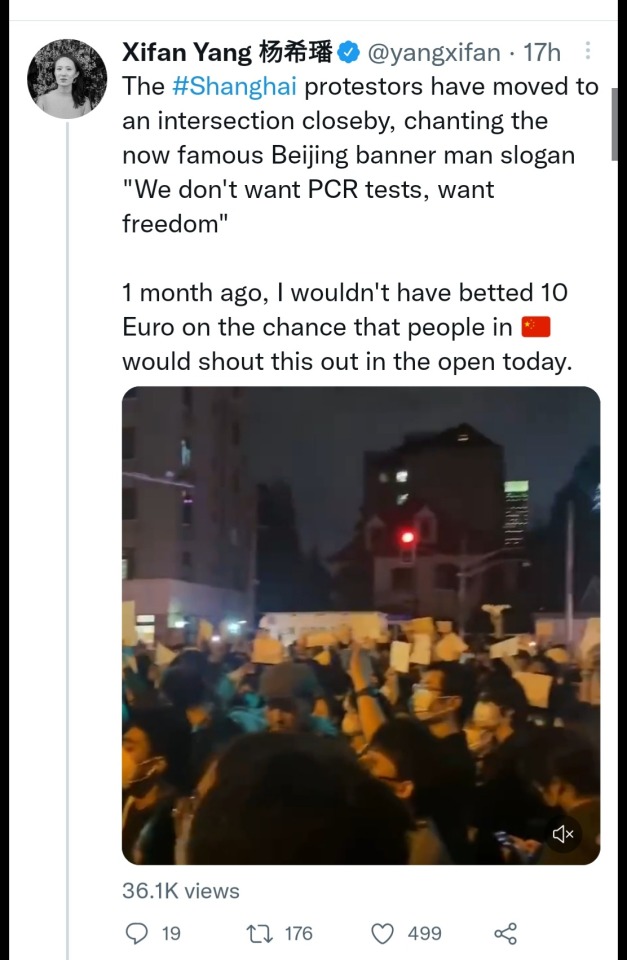


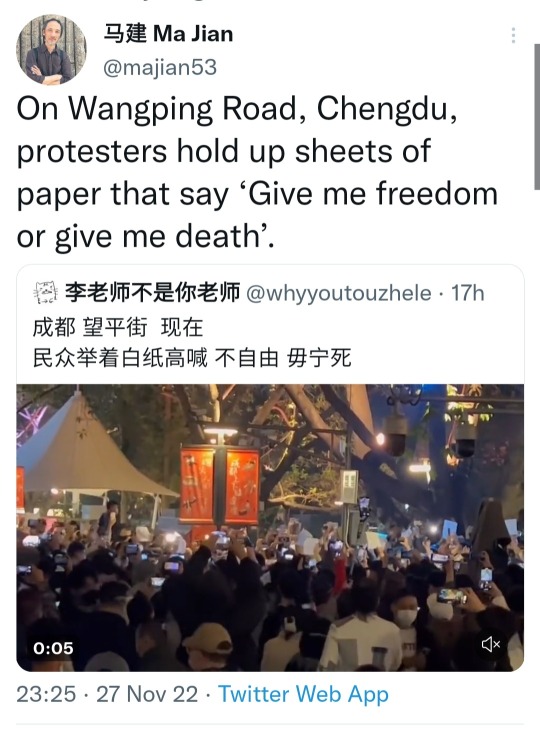


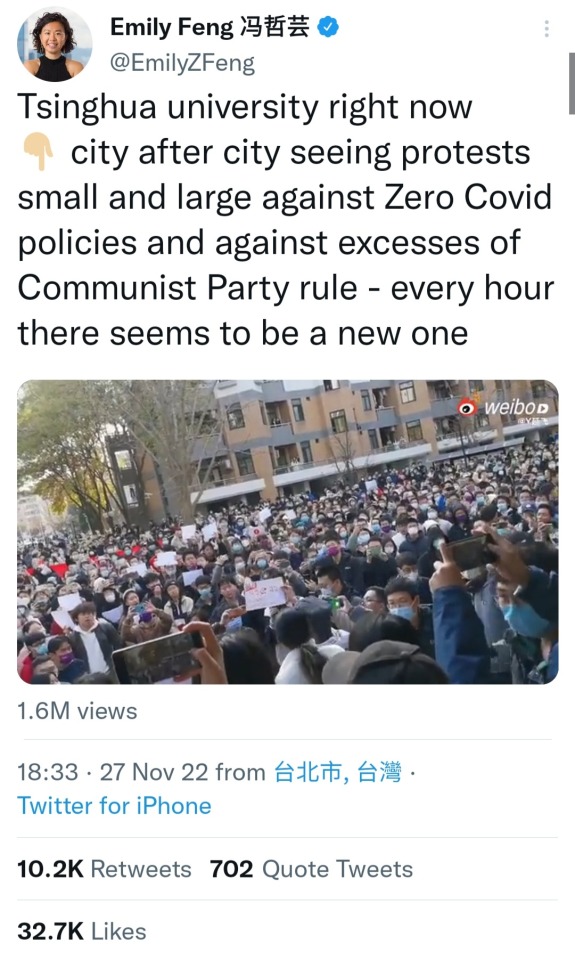

Since late last week, mass demonstrations have broken out in major cities, including Shanghai, Beijing, Nanjing, Wuhan, Urumqi and others.
.
Sunday’s protests broke out after an apartment fire three days earlier in Urumqi, the capital of China’s Xinjiang region, killed 10 people and injured nine others. Urumqi’s local government has denied that evacuation of residents was affected by lockdown measures, repudiating widely circulated videos that showed firefighting efforts hampered by lockdown measures in the city.
25 notes
·
View notes
Link
youtube
China: Video shows BBC journalist's arrest during Covid protest, November 28, 2022
Video shared on social media shows the moment BBC journalist Edward Lawrence was arrested by Chinese authorities while covering an anti-lockdown protest in Shanghai. Lawrence was dragged away by police shouting "Call the Consulate, now." Protests over Covid restrictions have spread to several cities across China and were triggered by a deadly fire at a residential high-rise building in the city of Urumqi, in the country's western Xinjiang region. Videos of the incident posted on social media led to accusations that lockdowns were a factor in the blaze that killed 10 people
The Guardian
Further reading:
The Guardian: Clashes in Shanghai as protests over zero-Covid policy grip China, November 28, 2022
The Guardian: BBC says Chinese police assaulted and detained its reporter at Shanghai protest, November 28, 2022
The Guardian: Protests erupt in China over strict zero Covid measures: in pictures, November 28, 2022
“He was held for several hours before being released,” a BBC Press Team statement said of Lawrence’s treatment by Shanghai police on Monday. “During his arrest, he was beaten and kicked by the police. This happened while he was working as an accredited journalist… We have no official explanation or apology from the Chinese authorities, beyond a claim by the offices who later released him that they had arrested him for his own good in case he caught Covid from the crowd.”
The public service broadcaster added that it did not consider the police explanation to be credible.
HKFP: China protests: Shanghai police assaulted and arrested journalist, says BBC, November 28, 2022
#china#coronavirus#xi jinping#protest#Urumqi#Xinjiang#pandemic#zero covid policy#Chinese Communist Party#shanghai#BBC#Edward Lawrence#The Guardian#Reuters#Beijing#Chengdu#Lanzhou#Nanjing#Guangzhou#Hong Kong#Chongqing#Wuhan#politics#freedom of the press#police brutality#Hong Kong Free Press#journalism#violence#authoritarianism
13 notes
·
View notes
Text
BEIJING — Cities across China further unwound COVID restrictions Friday, loosening testing and quarantine rules in the wake of nationwide protests calling for an end to lockdowns and greater political freedoms.
Anger and frustration with China's hardline pandemic response spilled out onto the streets last weekend in widespread demonstrations not seen in decades.
In the wake of the unrest across China, a number of cities have begun loosening COVID-19 restrictions, such as moving away from daily mass testing requirements, a tedious mainstay of life under Beijing's stringent zero-COVID policy.
At the same time, authorities are continuing to seek to contain protests with heavy security on the streets, online censorship in full force, and surveillance of the population heightened.
As of Friday, the southwestern metropolis of Chengdu will no longer require a recent negative test result to enter public places or ride the metro, instead only requiring a green health code confirming they have not travelled to a "high risk" area.
In Beijing, health authorities called Thursday on hospitals not to deny treatment to people without a negative PCR test taken within 48 hours.
In January, a pregnant woman in the city of Xi'an miscarried after being refused hospital entry for not having a PCR test result.
China has seen a string of deaths after treatment was delayed by COVID restrictions, including the recent death of a 4-month-old baby who was stuck in quarantine with her father.
Those cases became a rallying cry during the protests, with a viral post listing the names of those who died because of alleged negligence linked to the pandemic response.
Many other cities with virus outbreaks are allowing restaurants, shopping malls and even schools to reopen, in a clear departure from previous tough lockdown rules.
In northwestern Urumqi, where a fire that killed 10 people was the spark for the anti-lockdown protests, authorities announced Friday that supermarkets, hotels, restaurants, and ski resorts would gradually be opened.
The city of over 4 million residents endured one of China's longest lockdowns, with some areas shut in early August.
Home quarantine
An analysis by state-run newspaper People's Daily on Friday quoted a number of health experts supporting local government moves to allow positive cases to quarantine at home.
The shift would be a marked departure from current rules, which require that they be held in government facilities.
The southern factory hub of Dongguan on Thursday said that those who meet "specific conditions" should be allowed to quarantine at home. It did not specify what those conditions would be.
The southern tech hub Shenzhen rolled out a similar policy Wednesday.
Central government officials have also signaled that a broader relaxation of zero-COVID policy could be in the works.
Speaking at the National Health Commission Wednesday, Vice Premier Sun Chunlan said the omicron variant was weakening and vaccination rates were improving, according to the state-run Xinhua news agency.
A central figure behind Beijing's pandemic response, Sun said this "new situation" required "new tasks.”
She made no mention of zero-COVID in those remarks or in another meeting Thursday, suggesting the approach, which has disrupted the economy and daily life, might soon be relaxed.
12 notes
·
View notes
Text
Мы знаем
Страшное, грубое, липкое, грязное, Жестко-тупое, всегда безобразное, Медленно рвущее, мелко-нечестное, Скользкое, стыдное, низкое, тесное, Явно довольное, тайно-блудливое, Плоско-смешное и тошно-трусливое, Вязко, болотно и тинно застойное, Жизни и смерти равно недостойное, Рабское, хамское, гнойное, черное, Изредка серое, в сером упорное, Вечно лежачее, дьявольски косное, Глупое, сохлое, сонное, злостное, Трупно-холодное, жалко-ничтожное, Непереносное, ложное, ложное! Но жалоб не надо; что радости в плаче? Мы знаем, мы знаем: всё будет иначе.
post a poem before go to bed.
That perfectly sums up how I felt when those events happened. I still remember the student demonstrations at school last term...young people felt like they were fighting for the dead and the dying, but the elders just laughed and thought we were fooling around. After the fire in Urumqi I copied this poem in my diary (Chinese version of course) I can do nothing but silent anger... It's ironic that after three years of lockdown it was suddenly over...then I got corona (finally...) and am still alive.
What are we doing? The memory of epidemic prevention seems to have been forgotten by people in the past two months, just like a history book summarizes the suffering of countless people in a few words. But I don't think the average person can live a normal life without forgetting the depressing events.
Our nation always celebrates suffering and thinks it has a huge meaning...It's funny, I only see real people being tortured.
"Love specific people", who said that? Tolstoy or Dostoevsky? I don't think they understand at all...
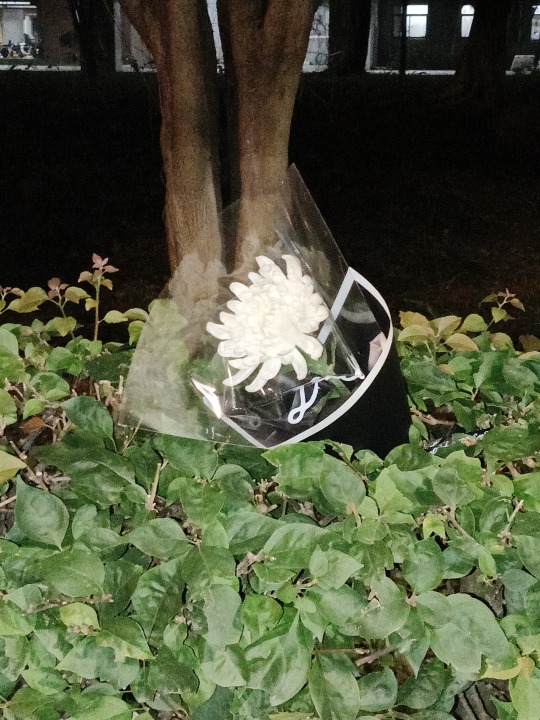
7 notes
·
View notes
Text
CNN:
China Xinjiang: Urumqi rocked by Covid lockdown protests after deadly fire
Videos shared on social media in China have appeared to show fresh protests against Covid restrictions, after an apartment block fire killed 10 people.
People in Urumqi are seen confronting officials, breaking down a barrier and shouting "end the Covid lockdown".
Global Times:
The government of Urumqi, capital of Northwest China’s Xinjiang Uygur Autonomous Region, announced on Saturday morning that the city has basically cleared COVID-19 cases at community level, and will restore order to the lives of residents in low-risk areas in a phased manner.
Separately, on Saturday, Ma Xingrui, Party chief for Xinjiang region, stressed in Hotan Prefecture that officials should put people and lives first, follow the ninth version of Protocol for Prevention and Control of COVID-19, implement 20 optimized anti-epidemic measures, improve strategies, quickly stop the virus spread, resolutely win the battle against the epidemic, and protect the life and health of people of all ethnic groups to the greatest extent possible.
Ma requested local officials at all levels to clearly be aware of the severity and complexity of the epidemic situation in Hotan, take targeted measures in light of local conditions, and scientifically analyze the situation in different regions, such as urban and rural areas, so as to pool resources to contain the epidemic in key regions quickly, accurately and efficiently.
Ma said the authorities should do a good job in providing psychological counseling, attach great importance to and make every effort to address people's demands for urgent and sudden difficulties, such as seeking medical treatment.
All local authorities and departments should always tighten the safety of production, comprehensively investigate risks and hidden dangers in key industries such as hazardous chemicals, mining, transportation and construction, promptly carry out fire safety control in factories and warehouses, logistics and storage, high-rise buildings and large complexes, and resolutely prevent major accidents from occurring.
11 notes
·
View notes
Photo
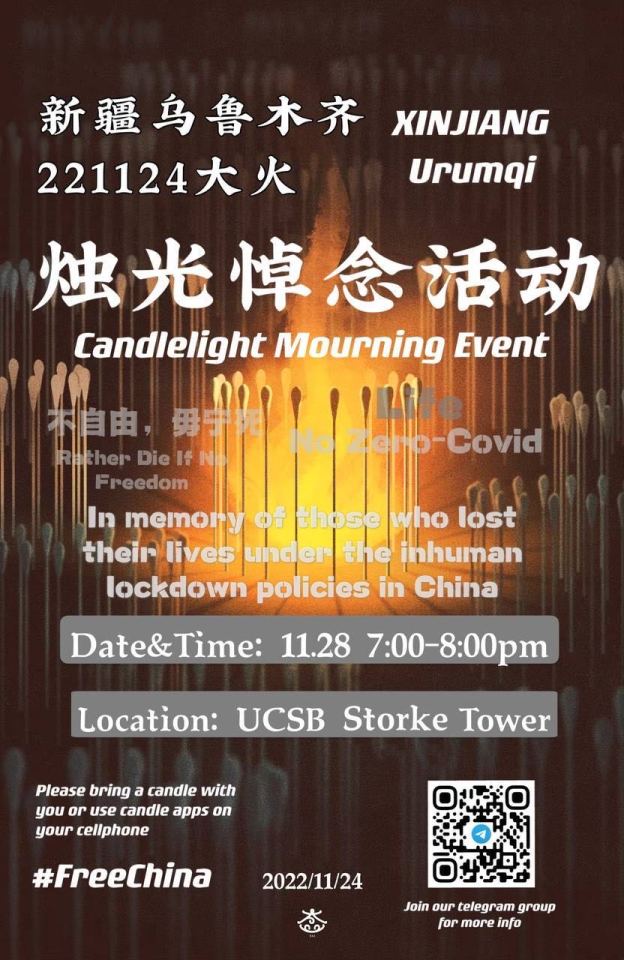
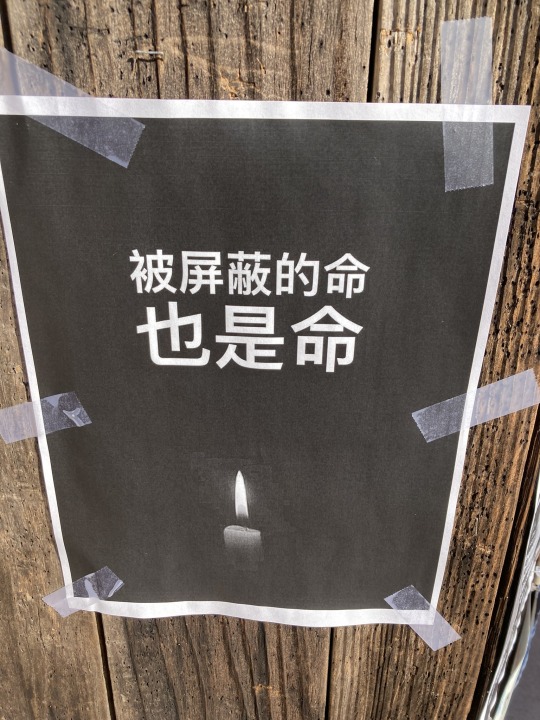
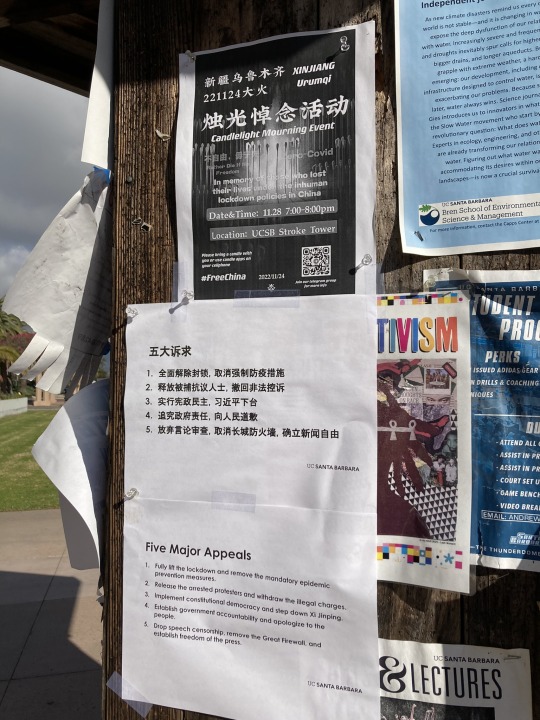
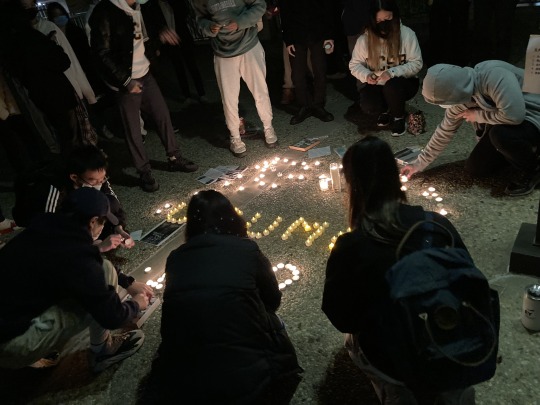
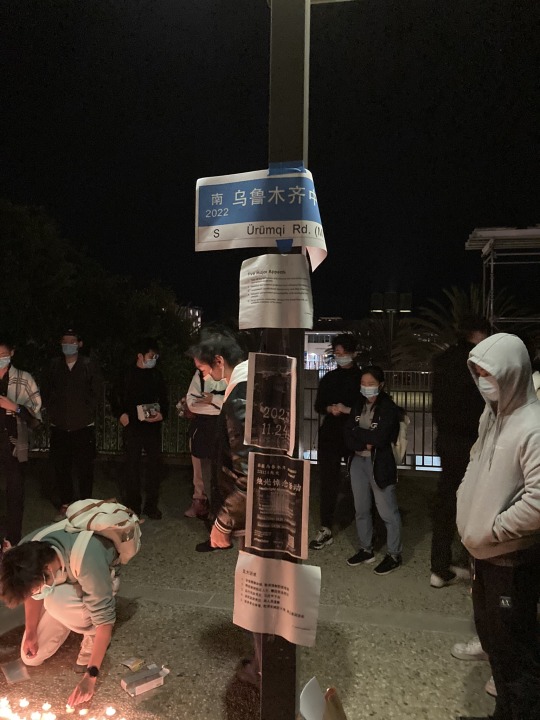

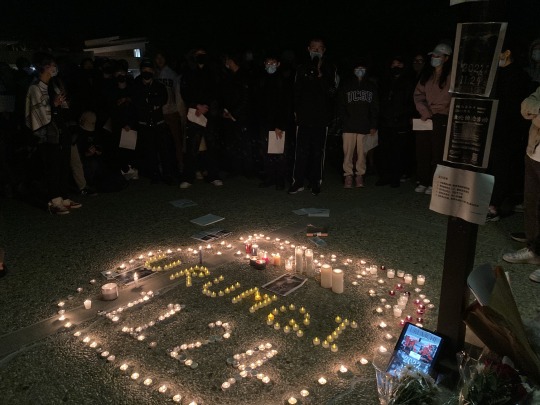

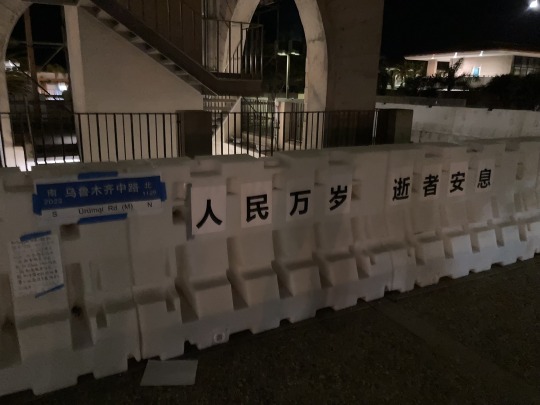
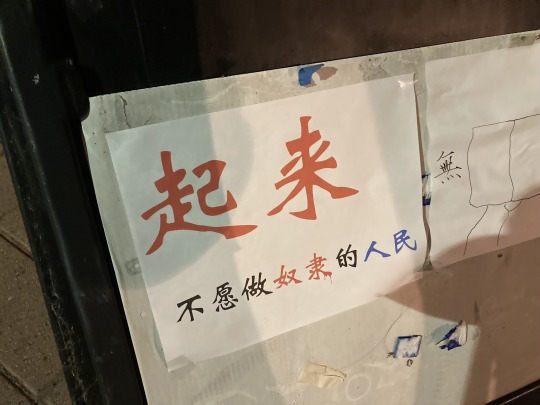
新疆乌鲁木齐大火烛光悼念活动。大概有一百多的中国留学生参加,我听了无数的年轻人自发地讲话,他们分享了自己亲朋好友以及中国同胞所受到的压迫,我们都一起喊了“习近平下台”之类的话,感觉中国终于有希望了,真的很感动!
Candlelight vigil for the victims of the fire in Urumqi, Xinjiang. About hundred or so Chinese students participated in the event, and I heard countless young Chinese spontaneously speak out, sharing their own experiences with political repression and even shouting lines like “Xi Jinping, step down!” It feels like China finally has hope again--it was genuinely really moving!
9 notes
·
View notes
Text
Decades ago, Western political scientists began asking a question that has never been fully resolved but has also never seemed more urgent. They noted that since World War II, extremely few countries had joined the ranks of the globe’s truly wealthy nations and almost all that had were already democracies or were in the midst of political transitions that would lead to systems that gave citizens a choice in the selection of leaders. So, they wondered: Could China, the world’s largest country—and, since the Soviet Union’s demise, the most powerful and, in aggregate terms, richest authoritarian society—buck the trend?
If it failed to do so, China would be said, in the jargon of experts, to have succumbed to the middle-income trap: a theoretical snare awaiting countries that failed to liberalize their political systems no matter how successful they had appeared during an early phase of economic takeoff.
Chinese President Xi Jinping has been mindful of this challenge and at times has even boasted about his country’s ability not only to break this mold of notional constraints but also to prove the superiority of his version of authoritarian rule. Now, no sooner than Xi has engineered changes in China’s leadership succession rules so that he can preside over his country for life, a crisis that may come to be seen as an ideal test of the middle-income trap theory is upon him.
Its proximate cause appears to have been an apartment block fire in the far western Chinese city of Urumqi that killed 10 people. It reportedly took firefighters more than three hours to put out the blaze, which local officials said was caused by a faulty power strip, causing many on social media to speculate that the city’s ongoing strict COVID-19 lockdown measures may have hampered the response and prevented residents from evacuating. Chinese authorities have denied this and even suggested that blame lay with the apartment dwellers for being slow to flee.
The shocking news of this incident has set off the most serious political protests in China since the 1989 Tiananmen Square crisis, with Chinese people in a rapidly growing number of cities—including the place where Xi himself studied in Beijing, Tsinghua University—coming out in the streets by the thousands to hold up blank sheets of paper, symbolizing censorship, and braving arrest as they chant recently unimaginable slogans such as “Step down, Xi Jinping! Step down, Communist Party!” and “Don’t want dictatorship, [we] want democracy!”
Yet as tempting as it will be for many, it is wrong to see this crisis as solely the result of a spark from Urumqi. This challenge to the Chinese Communist Party (CCP) and the state has been building for some time. The country’s unusually strict and prolonged campaign to contain the COVID-19 pandemic has been a source of deep discontent for many months, leaving many Chinese people feeling disenchanted with Xi, who seems more obsessed with control than any leader since Mao Zedong.
After a previous incident in September involving the crash of a bus carrying people from the locked-down city of Guiyang to a quarantine camp, which killed 27 people, the number of messages I began receiving from friends in China that spoke of wanting to leave the country or mentioned stories of others who had already escaped skyrocketed. That may seem merely anecdotal, but what happened next was anything but.
On Oct. 13, on the eve of the Party Congress in Beijing where Xi effectively coronated himself—and amid high, citywide security—a man hung large protest banners on Sitong Bridge, which passes over a major central thoroughfare, denouncing not just the country’s zero-COVID policy but also Xi’s dictatorship, censorship, personality cult, and suppression of human rights. The banners read:
We don’t want nucleic acid testing, we want food to eat;
We don’t want lockdowns, we want freedom;
We don’t want lies, we want dignity;
We don’t want Cultural Revolution, we want reform;
We don’t want [dictatorial] leaders, we want elections;
We don’t want to be slaves, we want to be citizens.
In an echo of the famous Tank Man of Tiananmen, the man was arrested and reportedly has not been seen or heard from since. State censors made furious attempts to remove mention of the protest from webpages and social media, but the intensity of interest overwhelmed them.
The next highly unusual occurrence happened during the Party Congress itself, when Xi’s predecessor as CCP general secretary, Hu Jintao, was ushered off the main dais at a critical moment during the proceedings. Hu had just reached for a folder that is thought to have contained the final list of the members of the Politburo Standing Committee, the highest instance of power in the country after the general secretary. One theory is that Hu suspected that Xi had not respected commitments to allow people other than his closest personal allies to sit on the body, erasing past practices of relatively collective rule. Another leader prevented Hu from opening the folder, and then Xi gave the signal for him to be unceremoniously led out.
While it may be impossible to know exactly what transpired, many people in China responded with shock, as if they had finally realized how deep the country had descended into a new stage of despotism. Again, many friends in China wrote to me, asking what I had heard and writing that they could not afford to say anything, except to deplore the overall situation in the country.
Although the details of these recent events are unique, some of their contours bear strong resemblance to previous crises in the country. Take, for instance, the 1989 Tiananmen crisis. Although Deng Xiaoping, as paramount leader, eventually approved the murderous crackdown on the student and worker demonstrators who filled the square, he later said privately that it was “very unhealthy” for “the destiny of a country to be built on the prestige of one or two people.” Not since Mao has China been so dominated by a single figure as Xi.
Even worse, under Xi, at each hint of crisis, whether economic—as with the pandemic-induced slowdown or a real estate bubble—or now political, instead of the liberalizing reforms his country and its broad middle classes need and hope for, Xi has reflexively become even more sternly top-down and authoritarian in his response. This ominously echoes his famous comment about the end of Soviet rule under Mikhail Gorbachev in which Xi said the Soviet Union’s Communist rulers lost their nerve, meaning that they failed to rule without flinching and to crack down on opposition mercilessly when necessary.
No one knows what is in Xi’s mind, but he is surely aware of the example of Zhao Ziyang, his predecessor decades ago as CCP general secretary during the Tiananmen crisis (a position under Deng). Zhao, in that much simpler and poorer time, had warned that “reform includes reform of the economic system and reform of the political system. These two aspects affect one another. … If [political reform] lags too far behind, continuing with the reform of the economic system will be very difficult, and various social and political contradictions will ensue.”
Zhao had envisioned clear separations between the role and authority of the party and the government; much more independence for the country’s courts; an end to the purely rubber-stamp function of the country’s parliament; increased freedom of speech and of the press; and even a greater role for the country’s tiny, authorized alternative political parties. He and his allies argued that if the people were not granted freer expression, society would have no pressure valve, practically guaranteeing explosive crises in the future. Xi seems to have never thought well of any change that might reduce the CCP’s power, but it seems likely that even he knows that at some point China’s political system will have to adapt for the country to continue to modernize and escape the theoretical middle-income trap.
His problem, like that of so many leaders who concentrate immense power in their own hands, is that no moment ever quite looks like a good one to make serious, substantive change. The difference between Xi and Deng, who had previously long been considered the country’s most powerful ruler since Mao, is that Deng always took care to have high-profile politicians executing decisions and implementing policy in the foreground. Under Xi, who seems to utterly dominate every important committee and instance of power himself, there is no one but the great leader himself. When the Tiananmen crisis broke, Deng could blame Zhao—and did. Xi, however, has no meaningful deputy or surrogate and therefore has no one else to blame.
This places him in the teeth of an altogether different trap. If he orders his troops and police to execute a heavy-handed crackdown on a fed-up and networked citizenry, things could get bloody quickly, as with Tiananmen—with grave consequences not just for his relationship with his people but also for China’s place in the world. It is even possible that some of his commanders could refuse to execute his orders, as at least one principled general named Xu Qinxian did during Tiananmen.
On the other hand, if Xi abruptly changes strategy and puts on the garb of a supple moderate, people both within his system and without may decide that he is weak and vulnerable and become emboldened to mount bigger challenges to his authority.
One way or another, China is poised on an uncomfortable fulcrum right now, and it will have to choose a course.
5 notes
·
View notes
Text
Some report about the recent events happening in China from English news media.
The New York Times: Protests Erupt in Shanghai and Other Chinese Cities Over Covid Controls
BBC: Covid protests widen in China after Urumqi fire
CNN: Protests erupt across China in unprecedented challenge to Xi Jinping’s zero-Covid policy
Reuters: Protests in Shanghai and Beijing as anger over China's COVID curbs mounts
The Guardian: Anti-lockdown protests spread across China amid growing anger at zero-Covid strategy
AP News: More anti-COVID protests in China triggered by deadly fire
The Wall Street Journal: Chinese Protests Spread Over Government’s Covid Restrictions
if you need more context, please view my early post:
or this tweet: (there is a complete timeline)
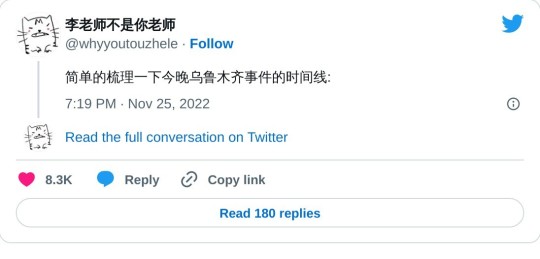
Also I'd like to explain something mistaken by the English media that holding blank white paper while protesting was not mean for mourning or for funerals, but for pointing out that we were not allowed to speak the truth or express our opinion under such a authoritarian government. Everything posted online would be immediately censored and deleted and people would get punished.
Reblogging is very much appreciated. Thank you all so much.
祝大家自由,勇敢,平安。
#urumqi#shanghai#xinjiang#China#Chinese news#Chinese protest#covid 19#pandemic#international news#chinese politics#international politics#blockade#protest#中国#新疆#乌鲁木齐#上海
257 notes
·
View notes
Photo
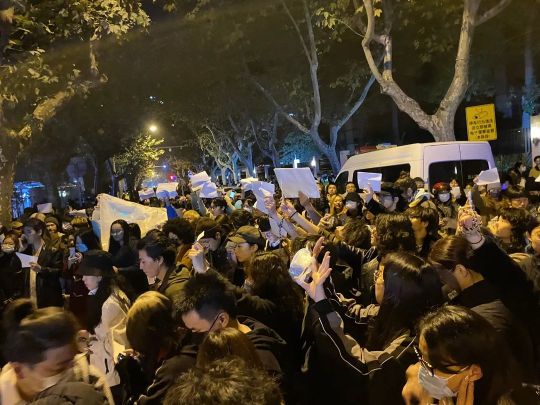
Brave! How the deadly fire in #Xinjiang ignites a wave of protest against #China’s #zeroCovid #lockdown policy? #China #Shanghai #COVID19 #ChinaUprising #Urumqi #UrumqiRoadShanghai #UrumqiProtest https://www.reuters.com/world/china/shanghai-hit-by-covid-protests-anger-spreads-across-china-2022-11-27/ https://www.instagram.com/p/CldYYIqLa7z/?igshid=NGJjMDIxMWI=
#xinjiang#china#zerocovid#lockdown#shanghai#covid19#chinauprising#urumqi#urumqiroadshanghai#urumqiprotest
4 notes
·
View notes
Text
[TITLE LEFT INTENTIONALLY BLANK]: Protesting in the People’s Republic
It is a universally known fact that the People’s Republic of China is perhaps not the most magnanimous to the freedom of speech of its citizens. In the past, we have seen China’s authoritarian government crack down on citizen protests by any means necessary: whether that be forced disappearances, disinformation, or rolling tanks into public squares. These past atrocities have cast a long shadow upon China’s recent history and social movements; many activist movements in China peter out due to state-sponsored efforts against them. However, with the recent anti-COVID measures protest stemming from the tragedy of a deadly fire in Urumqi, we may yet see a new paradigm through which protests spread in China: through social media savvy.
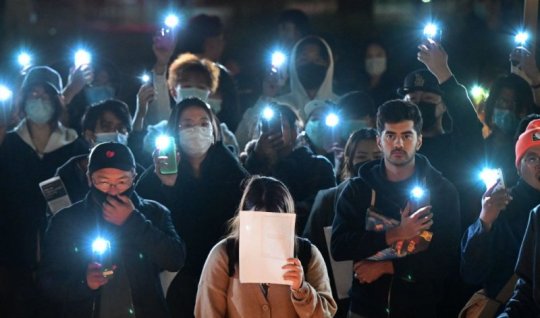
As discussed in Qin, Stromberg, and Wu (2019, pp.7-9), the centralised, controlled nature of Chinese social media actively stems the tide of protest; in either active or reactive ways, the Chinese government can respond to calls for protests that do spread on apps like Sina Weibo. However, the sheer speed of social media mitigates these issues to an extent: activists have leveraged them to spread movements and protest tactics far and wide across China. In the recent Urumqi protests, we have seen these tactics spread in real time. As Perrigo (2022) notes, protesters against the Zero-COVID regulations and fire in Urumqi have taken to displaying a blank sheet of paper to express their discontent: a move both symbolic of “everything protesters wish they could say but cannot” and practical as a move to “confound online censors” and gain a better chance for their message to come through amidst heavy censorship. In addition to this, to circumvent censors on the discussion of these protests and highlight the ridiculousness of Chinese censorship, Sina Weibo users have taken to simply posting affirmative characters or ‘censored’ black squares in support of these protests (Yu 2022).
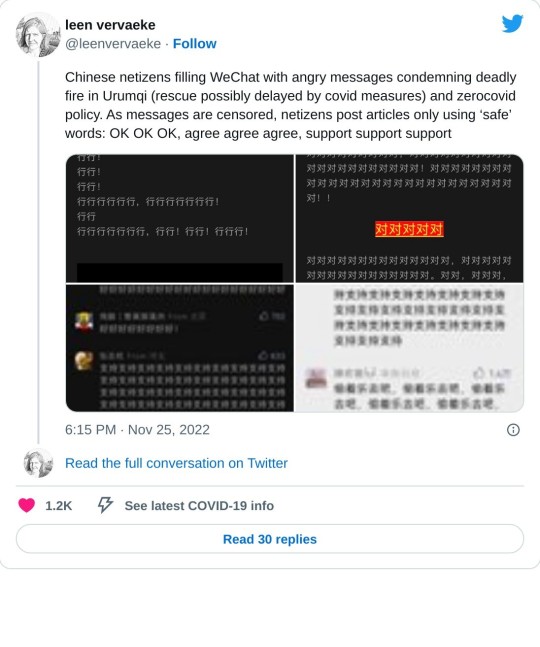
View on Twitter
To an extent, the usage of these tactics on Sina Weibo and other social networking apps within the Great Firewall of China’s infrastructure has yielded results unprecedented in China’s recent history: Mao (2022) reports that China’s government has yielded on its strictest Covid policies and lifted lockdowns in major cities in the aftermath of these protests. The occurrence of these protests has also indicated major changes in China, especially with regards to its activist culture: as the online sphere grows more malleable, the CCP government faces issues in quelling general protests that can spread across broad swathes of its newly-protest-hungry society (Hurst 2022).
In essence, even amidst the immense centralisation and government control of China’s social media, activists have found methods through which their voices can be heard, and their actions mobilised to affect change in a system often cited for its risk of violent suppression of dissent.
References
Hurst, W 2022, “What the protests tell us about China's future,” Time, Time, viewed 8 December, 2022, <https://time.com/6238800/china-protests-reveal-about-the-country/>
Mao, F 2022, “China abandons key parts of zero-covid strategy after protests,” BBC News, BBC, viewed 8 December, 2022, <https://www.bbc.com/news/world-asia-china-63855508>
Perrigo, B 2022, “Why a blank sheet of paper became a protest symbol in China,” Time, Time, viewed 8 December, 2022, <https://time.com/6238050/china-protests-censorship-urumqi-a4/>
Qin, B., Strömberg, D. and Wu, Y., 2019. Social media, information networks, and protests in China. Work. Pap., Stockholm Univ., Stockholm, Swed.
Yu, C 2022, “China's zero-Covid Anger is erupting,” The Spectator, viewed 8 December, 2022, <https://www.spectator.co.uk/article/chinas-growing-anger-over-zero-covid/>
2 notes
·
View notes
Text
In front of the Chinese Consulate General in Los Angeles, protesters rally against the Chinese government after the horrific Urumqi apartment fire in Xinjiang was made worse by China's very broken "zero-COVID" policy. At least ten people died in the fire, including a 3-year-old. The ethnic Uyghur minority seems to have been heavily impacted. The Uyghur people have already been facing a genocide at the hands of the Chinese government. Protesters here want to show solidarity for what now seems to be the largest protest movement in China since Tiananmen Square in 1989.
2 notes
·
View notes